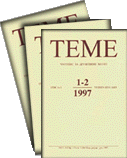ТАНАТОЛОГИЈА МАРТИНА ХАЈДЕГЕРА
Thanatology of Martin Heidegger
Author(s): Vladimir N. CvetkovićSubject(s): Philosophy
Published by: Универзитет у Нишу
Keywords: Dasein; Death; Being-towards-death; They-self; Nazism;
Summary/Abstract: The political engagement of Martin Heidegger or "Heidegger's case" is for more than a half of century the reason of the scholarly debate about his work. There are wide ranges of attitudes about his work: from those, which in his work see the incoming ideology of Nazi movement; the moderate stances see in his political engagement just an error of a philosopher like Plato's in Syracuse. The attempts to justify his political engagements show that Heidegger tried to protect German University from the experiments of Nazis regime. We will focus in this article on Heidegger's analysis of the phenomenon of death in his Being and Time. In his analysis of the phenomenon of death many scholars have seen the ethics of death, practiced in the massive production of death in Nazis' concentration camps. In spate of the fact that analysis of death is not one of the main pillars of his work such as: Being-in-the-world, Care and Temporality, death has great significance. Death is the way from Care to Temporality and in death Dasein finds the liberation from the inauthentic being and they-self. Man is being-towards-death. Through death Dasein is liberating from the "Being-there" and opens the possibility of Being-a-whole. The freedom-towards-death is a connection to potentiality-for-Being. The Heidegger's analysis of death is the most expanded elaboration of death after the Antiquity and Middle Ages and the most painful because the faith in immortality (eternity) of human soul is replaced with a standpoint in which the death is the highest possibility of human being.
Journal: Teme - Časopis za Društvene Nauke
- Issue Year: 2004
- Issue No: 01
- Page Range: 131-141
- Page Count: 11
- Language: Serbian

